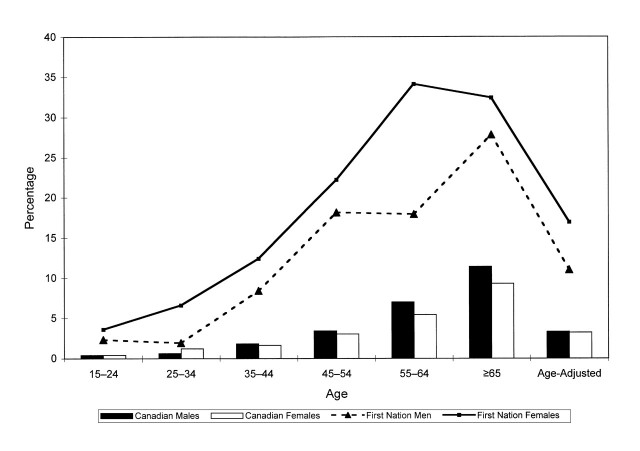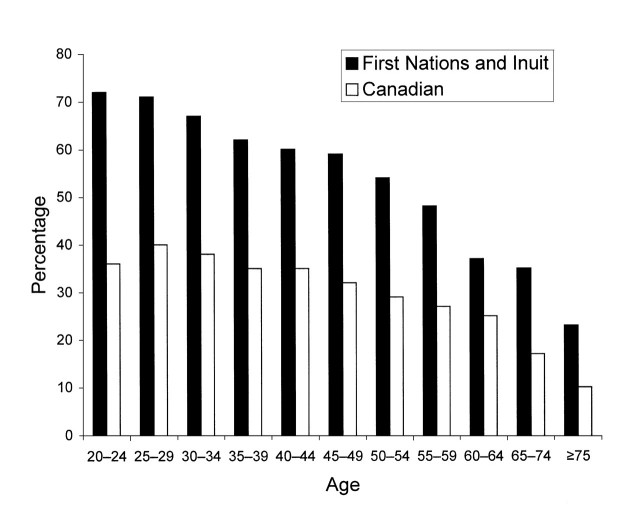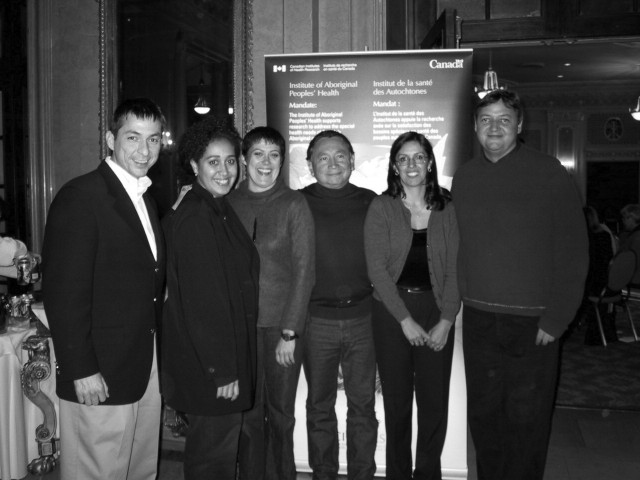Abstract
In the past and in the present, research studies and media reports have focused on pathology and dysfunction in aboriginal communities and have often failed to present a true and complete picture of the aboriginal experience. The Canadian Institutes of Health Research Institute of Aboriginal Peoples’ Health is a national strategic research initiative led by both the aboriginal and research communities. This initiative aims to improve aboriginal health information, develop research capacity, better translate research into practice, and inform public health policy with the goal of improving the health of indigenous peoples.
INDIGENOUS PEOPLES around the globe endure profound disparities in health. In developed countries, the health profile of indigenous peoples is most commonly associated with noncommunicable chronic diseases and lifestyle-related health issues such as type 2 diabetes mellitus (Figure 1▶),1,2 tobacco use (Figure 2▶),3 substance use, and violence.4
FIGURE 1.
—Age- and gender-specific and age-adjusted prevalence (%) of type 2 diabetes mellitus among First Nations and Inuit people and the Canadian population as a whole.
FIGURE 2.
—Rates of smoking (%) among First Nations and Inuit people and the Canadian population as a whole, by age.
ORIGINS OF THE INSTITUTE OF ABORIGINAL PEOPLES’ HEALTH
In response to a growing public health burden, the idea for creating a research institute devoted solely to aboriginal health had its genesis in September 1999. A group of leading Canadian health researchers, aboriginal and nonaboriginal, urged the federal government to consider a specialized research funding agency dedicated to aboriginal health research and capacity building. The group firmly believed this approach would contribute significantly to the overall health and well-being of aboriginal people and hasten the elimination of disparities between aboriginal and nonaboriginal populations. The researchers also envisioned a cadre of expert and emerging researchers who would form a Canada-wide network that would strengthen information gathering and sharing, leading to heightened awareness and improved health among aboriginal populations.
The objective of the Canadian Institutes of Health Research (CIHR) is “to excel, according to internationally accepted standards of scientific excellence in the creation of new knowledge and its translation into improved health for Canadians, more effective health services and products and a strengthened Canadian health care system.”5 CIHR was presented with the group’s recommendations and subsequently launched the Institute of Aboriginal Peoples’ Health (CIHR-IAPH) in early 2000.
Consistent with the overall CIHR mandate, CIHR-IAPH promotes holistic and crossdisciplinary health exploration embracing the 4 pillars of health research—biomedical, clinical, health systems and services, and social, cultural, and environmental factors—as they affect the health of aboriginal populations. Health research that has a positive impact on the mental, physical, emotional, and spiritual health of aboriginal people at all life stages is promoted by CIHR-IAPH.
GOALS AND CORE VALUES
CIHR-IAPH will strive to improve the health of First Nations, Inuit, and Métis people by supporting innovative research programs based on scientific excellence and collaboration with the aboriginal community. The institute will play a lead role in building research capacity in the First Nations, Inuit, and Métis communities and will support partnerships and alliances between aboriginal communities and nonaboriginal health research organizations at the local, regional, national, and international levels. Critical to the accomplishment of our goals is the recognition that we will support health research that respects aboriginal cultures, while generating new knowledge to improve the health and well-being of aboriginal people both in Canada and abroad.
CIHR-IAPH will
Present health research results to aboriginal people in a way that is accessible, appropriate, and easily understood
Maintain ethical standards by adhering consistently to prescribed values and principles
Act in an honest, fair, and just manner
Aim to include aboriginal people in all health research activities
Share new knowledge with all research partners
Conduct all activities and business in a transparent manner
RESEARCH INITIATIVES
CIHR-IAPH supports research that addresses the special health needs of aboriginal people across Canada. The 4 strategic research priorities to be pursued over a 5-year period, beginning in 2002, are as follows:
To forge partnerships and share knowledge. Develop and nurture aboriginal health research partnerships with aboriginal and nonaboriginal organizations in the public and private sectors at all levels—local, regional, national, and international.
To respect aboriginal cultures. Maintain open, 2-way communication with CIHR to influence policy development on ethical standards, peer review processes, and knowledge translation systems that respect aboriginal cultures.
To build capacity. Build aboriginal health research capacity, especially among university graduate students studying aboriginal health.
To resolve critical health issues. Fund initiatives that address urgent or emerging health issues affecting aboriginal people.
CIHR-IAPH has already funded a series of exemplary aboriginal health research projects. The following projects were undertaken between January 2001 and March 2002.
Enhancing Survey Research Methods—Centre for Aboriginal Health
The Centre for Aboriginal Health will improve health survey activity in First Nation, Métis, and Inuit communities by producing high-quality, comparable, statistically valid, and culturally relevant data. Longitudinal data will be compiled to track changes in health over time.
Improving Access to Appropriate Health Services for Marginalized Groups
Members of marginalized groups may have limited access to, or feel constrained in accessing, appropriate health services. This research project involves a team of researchers who are exploring innovative ways to enhance access to health services for people on the fringes of society. Research results will inform policy, program, and management decisions relating to improved access to appropriate health services for identifiable marginalized groups.
Aboriginal Capacity and Developmental Research Environments (ACADRE)
A key CIHR-IAPH goal is to build capacity by developing researchers and providing continued support for scientific careers in aboriginal health research. The groundbreaking ACADRE program was launched on October 11, 2001, with up to Can $12 million in funding for the first 4 ACADRE centers over the next 6 years. These 4 centers are the initial links in what will become a network of centers across Canada responsible not only for developing the next generation of aboriginal health researchers, but also for focusing research efforts on determinants of health in aboriginal communities.
As they grow into their new roles, the 4 ACADRE centers will become more involved with the global aboriginal health research network and share their expertise with others around the world. Their joint goals are to promote information sharing on best practices in research methodology, develop resourceful partnerships, support ethical conduct, encourage community engagement, advance knowledge translation, and build research capacity through training and experience. Increasingly, they will initiate and participate in international exchange programs for researchers and research students involved in indigenous peoples’ health.
Centre for Aboriginal Health Research, Winnipeg, Manitoba.
The Centre for Aboriginal Health Research, affiliated with the University of Manitoba, was the first center to receive ACADRE funding. Its efforts will be concentrated in areas where the University of Manitoba has already established excellence in aboriginal health. Primary research themes include population health, health services, child health and development, and ethical issues in aboriginal health research. A secondary objective is to develop a research environment that encourages aboriginal students to pursue careers in health research. Health science career camps and undergraduate internships in health research are program ideas in the offing.
National Aboriginal Health Research Training Program, Edmonton, Alberta.
The Edmonton ACADRE center was set up to create a collaborative and interactive network of mentors in aboriginal health research training, bringing together resources from academia and aboriginal communities. This program will concentrate on research in 3 areas: (1) chronic health issues such as diabetes and heart and lung diseases; (2) child health, including fetal alcohol syndrome and fetal alcohol effects, nutrition, and acute illness; and (3) addiction, mental health, and suicide.
Indigenous Peoples’ Health Research Centre, Regina, Saskatchewan.
This research program is led by the Saskatchewan Indian Federated College, in partnership with the Universities of Regina and Saskatchewan. It takes a holistic approach, focusing on 4 areas: (1) chronic disease, nutrition, and lifestyle; (2) indigenous or traditional healing methods for addictions, including fetal alcohol syndrome, and mental health; (3) health delivery and control, including ethics, community development, and governance; and (4) environmental health.
Anisnawbe Kekendazone, Ottawa, Ontario.
Community Information and Epidemiological Technologies Canada and the Institute of Population Health at the University of Ottawa were also awarded a 3-year ACADRE grant. The center they established, Anisnawbe Kekendazone, will train aboriginal researchers by offering them opportunities to participate in high-profile indigenous research projects in Canada and around the world. Initial health research priorities at this facility are perinatal health, youth at risk and resilience, and knowledge translation (communicating health research knowledge to aboriginal communities in a way that is readily understood).
National Network for Aboriginal Mental Health Research
The innovative National Network for Aboriginal Mental Health Research, launched in November 2001, is cofunded by CIHR-IAPH and the CIHR Institute of Neurosciences, Mental Health and Addiction. The network addresses critical mental health needs of aboriginal people in rural and urban settings. It will train new researchers and will provide research consultation services for and in collaboration with aboriginal communities. Possible areas of mental health research include alcohol and drug addictions, volatile substance abuse, compulsive behaviors, suicide, abuse of prescription drugs, and sexual abuse.
Graduate Student Support
A significant portion of CIHR-IAPH funds go toward capacity building by supporting and nurturing graduate students pursuing careers in aboriginal health research. In March 2001, CIHR-IAPH hosted a gathering at the University of British Columbia at which 24 graduate students from across the country discussed capacity building and support, peer review and ethics, and knowledge translation and communications. They also shared their research with the group and voiced concerns over a number of issues, such as the need for more support from CIHR-IAPH, ethical research protocols, and a lack of networking opportunities. After that event, many more graduate students identified themselves to CIHR-IAPH. As a result, 60 participants attended the second such gathering, which was held in Ottawa in March 2002 in conjunction with the CIHR-IAPH advisory board meeting (photo on page 1399).
STRATEGIC RESEARCH INITIATIVES FOR 2001–2002
CIHR-IAPH posted several requests for applications on research topics that were linked to at least 1 of the institute’s 4 priorities, including a focus on child and youth health, diabetes and stress, fetal alcohol syndrome and effects, HIV/AIDS, improving access to appropriate health services for marginalized groups, preventable injuries and accidents, and innovative projects. The focus of the request for applications for “innovative projects” is on social and culture-based studies that aim to improve health (e.g., studies on traditional medicine, midwifery, or the link between indigenous knowledge and health).
INTERNATIONAL PARTNERSHIPS
Health disparities between aboriginal people and the general population in Canada are strikingly similar to those experienced by indigenous people in other developed, postcolonial countries with minority indigenous populations, including Native Americans, Alaska Natives, and Native Hawaiians. Canada can learn much from research conducted outside its borders. Thus, CIHR-IAPH has contacted several aboriginal health research organizations around the world, with impressive results.
A memorandum of understanding was signed in 2002 by chief executive officers of the Canadian Institutes of Health Research, the National Health and Medical Research Council of Australia, and the Health Research Council of New Zealand to cooperate on health research for indigenous populations.
On January 31, 2002, the Health Secretariat of the United Mexican States and CIHR signed a letter of intent to develop “health research, research training, clinical training, and knowledge translation based on equality, reciprocity, and mutual benefit.” Areas of potential collaboration agreed upon include environmental health, genetics and genomics, needs of indigenous people and vulnerable populations, health policy development, health services, financing, and electronic forms of knowledge transfer.
Figure.
Some participants in the CIHR-IAPH institute advisory board meeting and graduate student conference held in Ottawa in March 2002. Indigenous health researcher–practitioners from 5 countries are represented, underscoring the institute’s international and collaborative approach to global health research priorities. Left to right: Earl Nowgesic (Canada); Jacinta Elston (Australia); Dr. Sue Cringle (New Zealand); Michael Bird (United States of America); Dr. Maria del Consuelo Garcia Andrade (Mexico); and Dr. Jeff Reading (Canada).
PARTNERSHIPS WITH ABORIGINAL COMMUNITIES, ORGANIZATIONS, AND INDIVIDUALS
Perhaps the most important partnership of all is with aboriginal communities and individuals. CIHR-IAPH will ensure that aboriginal people are full partners in research, not merely informants and respondents. In the past, research has not always helped aboriginal communities, because it failed to address urgent health concerns and because there was little or no aboriginal ownership of research projects.
Increasingly, aboriginal communities are incorporating the principles of ownership, control, access, and possession into health research activities affecting them. These principles support valid and reliable research processes and products, which are based on aboriginal community needs and priorities and relevance within the context of aboriginal self-determination. Furthermore, these principles promote broader understanding and ways of knowing that include a more holistic approach, drawing heavily upon community-based, participatory research methods.
TRANSLATION AND USE OF KNOWLEDGE
Making research relevant to people is the cornerstone on which CIHR-IAPH stands; therefore, knowledge translation is essential. The term refers to the exchange, synthesis, and ethical application of knowledge by researchers and users. The goal is to accelerate the benefits of aboriginal health research, such as more effective services and products, a stronger health care system for indigenous people, and improved overall health.
All applications requesting CIHR-IAPH research funding must explain how research results will be disseminated and communicated in ways that are meaningful and beneficial to aboriginal organizations, communities, and individuals.
CONCLUSION
In Canada, indigenous peoples recognize that their legitimate aspirations to achieve selfdetermination are linked to the health of their families, community members, and nations.6 The principle of selfdetermination underscores the idea that health and well-being are achieved through success in a myriad of interconnected and developmental activities and that success is possible only within the context of selfdetermination. It is also recognized that equal human rights are achieved, in part, through autonomous and independent institutional development in pursuit of community self-determination.
Recently, the United Nations Permanent Forum on Indigenous Issues affirmed the importance of health information, including research: “For health equity approaches to be successful, systematic health and demographic information on all marginalized and disadvantaged groups, including indigenous and tribal peoples, is needed. At the same time, the increasing calls of indigenous and tribal peoples to be centrally involved in decisions affecting their health have to be heeded.”4
In a recent memorandum of understanding,7 Health Canada of the government of Canada and the Department of Health and Human Services of the government of the United States recognized
Our common objective to raise the health status of First Nation and Inuit people in Canada and American Indians and Alaska Natives in the United States; Our common interest in improving our approaches to health issues with First Nation and Inuit people in Canada and American Indians and Alaska Natives in the United States by identifying and reinforcing best practices; and Reaffirming our common interest in the sharing of knowledge and learning experiences, which will serve to strengthen our individual approaches to issues within the context of the respective countries.
Article 5 of the memorandum includes the plan of work, which states:
The Participants intend to develop a Plan of Work describing specific activities to be carried out under this Memorandum of Understanding. The Plan of Work may include but is not limited to:
Training in health data and financial management systems to better assist patient care needs;
Exchanging information on telemedicine and tele-health capabilities;
Collaborating on studies on chronic diseases of high prevalence in indigenous populations;
Cooperating on mechanisms to support indigenous populations in the hemisphere;
Providing guidance in working with universities and other nongovernmental organizations; and
Sharing of information on approaches to health care reform and the support of innovative approaches to health care delivery.
Clearly, a significant opportunity exists for meaningful transborder cooperation and collaboration between the national health research agencies of Canada and the United States. The creation of CIHR-IAPH as part of the Canadian health research enterprise is a recognition both of the contribution that an advanced research agenda can make to improve the public health burden borne by indigenous peoples and of the potential contributions that different “ways of knowing” could make to improving public health.
Peer Reviewed
References
- 1.Reading J, Elias B, McDonald G. Early onset of type 2 diabetes among First Nations in Canada. Can J Diabetes Care. 2000;24(Suppl 2):44–48. [Google Scholar]
- 2.Young TK, Reading J, Elias B, O’Neil J. (2000) Type 2 diabetes mellitus in Canada’s First Nations: status of an epidemic in progress. CMAJ. 2000;163:561–566. [PMC free article] [PubMed] [Google Scholar]
- 3.Reading J. The Tobacco Report. In: First Nations and Inuit Regional Health Survey National Report 1999. St Regis, Quebec: National Steering Committee of the First Nations and Inuit Regional Health Survey; 1999:87–135.
- 4.United Nations Economic and Social Council. Review of Activities of the United Nations system relating to indigenous peoples: an interactive discussion. E/CN.19/2002/2/Add.8. Available (in PDF format) at: http://www.unhchr.ch/indigenous/forum.htm. Accessed July 12, 2002.
- 5.Bill C-13, §4, C-6, RSC 2000.
- 6.Matthew Coon Come, Grand Chief, Assembly of First Nations. Open letter to the United Nations Permanent Forum On Indigenous Issues. May 13 2002. Available at: http://www.turtleisland.org/news/news-humanrights-indigenous.htm. Accessed July 12, 2002.
- 7.Secretary Thompson signs agreement with Canada on indigenous health during 55th World Health Assembly, Geneva, Switzerland. May 14, 2002. Available at: http://www.hhs.gov/news/press/2002pres/20020514.html. Accessed July 10, 2002.





